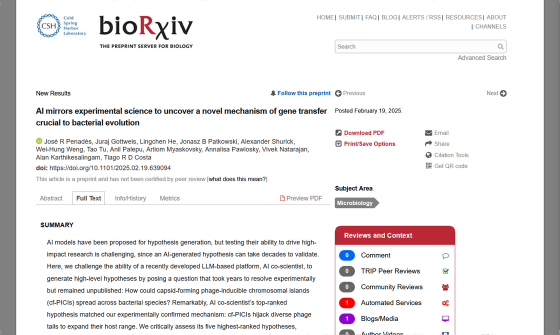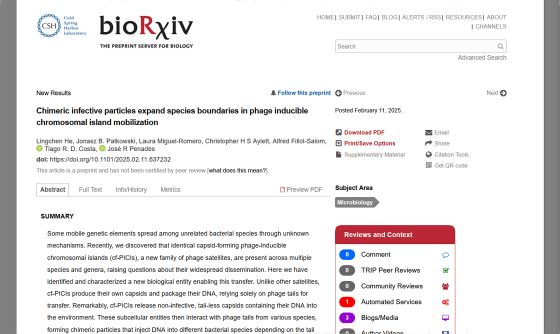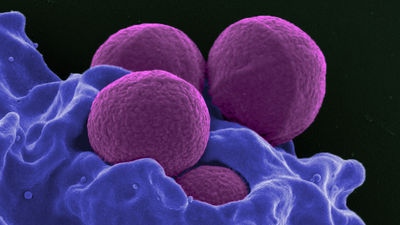Google's AI assistant for scientists reaches research results that took scientists 10 years to reach in just two days

In February 2025, Google
AI mirrors experimental science to uncover a novel mechanism of gene transfer crucial to bacterial evolution | bioRxiv
https://www.biorxiv.org/content/10.1101/2025.02.19.639094v1.full

Google's AI co-scientist could enhance research, say Imperial researchers | Imperial News | Imperial College London
https://www.imperial.ac.uk/news/261293/googles-ai-co-scientist-could-enhance-research/
Google's AI 'co-scientist' cracked 10-year superbug problem in just 2 days | Live Science
https://www.livescience.com/technology/artificial-intelligence/googles-ai-co-scientist-cracked-10-year-superbug-problem-in-just-2-days
Antibiotic resistance refers to infectious bacteria and viruses acquiring resistance to multiple antibiotics, which is causing serious health problems around the world. A research team including the University of Washington in the United States estimates that the number of deaths from antibacterial resistance will exceed 39 million by 2050, making it urgent to understand the process by which pathogens acquire antibacterial resistance and take measures against it.
A research team led by José Penades, a professor of microbiology at Imperial College London in the UK, has been studying the mechanism by which phage satellites, mobile genetic elements of phages called 'capsid-forming phage-inducible chromosomal islands (cf-PICIs),' which confer drug resistance to bacteria, infect various types of bacteria.
After 10 years of research and experiments, cf-PICIs have been found to release capsids that lack the 'tails' that typical phages use to inject genetic material into cells, and can interact with the tails of other phages to infect a wide variety of bacteria. The findings were reported in a non-peer-reviewed paper published on bioRxiv on February 11, 2025.
Chimeric infective particles expand species boundaries in phage inducible chromosomal island mobilization | bioRxiv
https://www.biorxiv.org/content/10.1101/2025.02.11.637232v1

Meanwhile, Google's research team asked Penades to test the performance of the AI co-scientist. Before publishing the results of their research, Penades and his team instructed the AI co-scientist to develop a hypothesis for the problem of 'how cf-PICIs infect different bacterial species.'
The supplemental information the research team provided to the AI included background information on phage satellites and key papers on cf-PICIs, but did not provide details of the research the team discovered.
As a result, the AI co-scientist proposed five major hypotheses in just two days, the most likely of which was that cf-PICIs infect different cell types through interactions with a wide range of phage tails, a hypothesis that Penades and his colleagues had spent 10 years coming up with.
Surprised by the AI's answer, Penades emailed Google to ask whether the AI co-scientists had access to their research. Naturally, Google responded that AI co-scientists do not have access to unpublished research.

'This means that the exact same hypotheses that we arrive at through years of painstaking scientific research can be proposed in a fraction of the time by an algorithm looking at the available evidence, analyzing possibilities, asking questions and designing experiments,' Penades said.
'Our findings suggest that AI has the potential to synthesize all available evidence and guide us to the most important questions and experimental designs,' said Dr. Tiago Dias da Costa of Imperial College London, who tested the AI co-scientist with Penades. 'If the system works as we expect, it could eliminate dead ends and allow progress to be made at incredible speed. This could be a game changer.'
The results of this study show that AI can potentially shorten the time it takes to arrive at a promising hypothesis, but it still requires experiments to verify the hypothesis. Google researchers expect that AI will accelerate and increase scientific discovery.
Related Posts:
in Software, Web Service, Science, Free Member, Posted by log1h_ik







